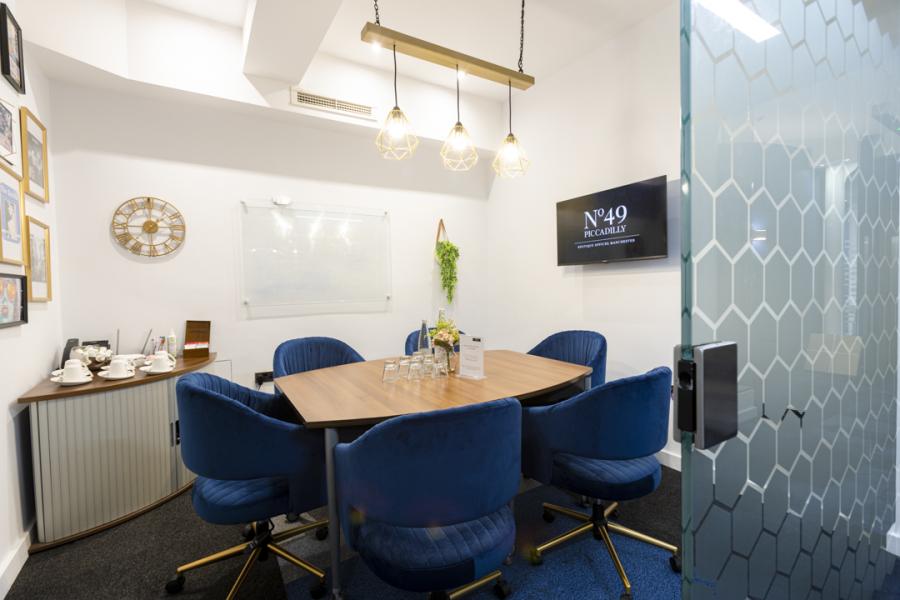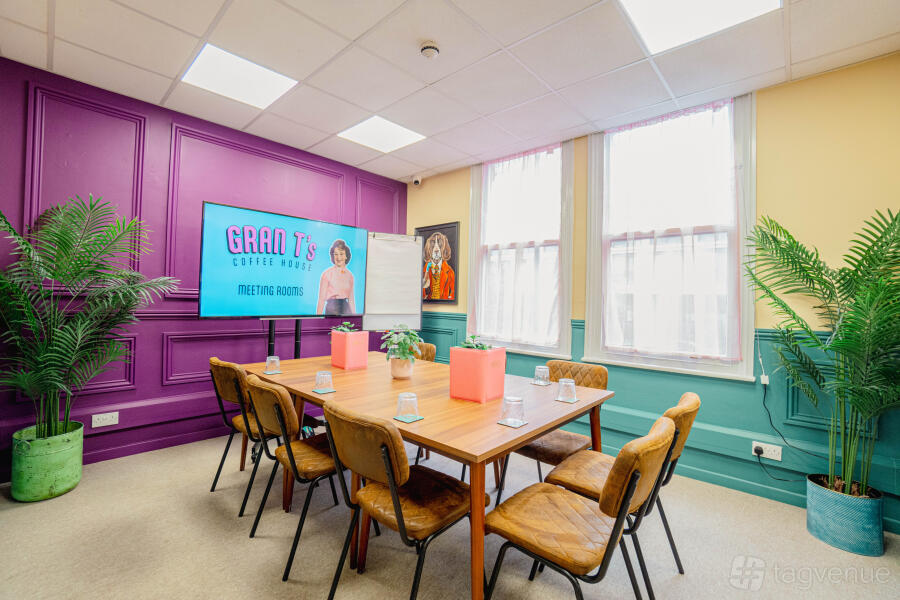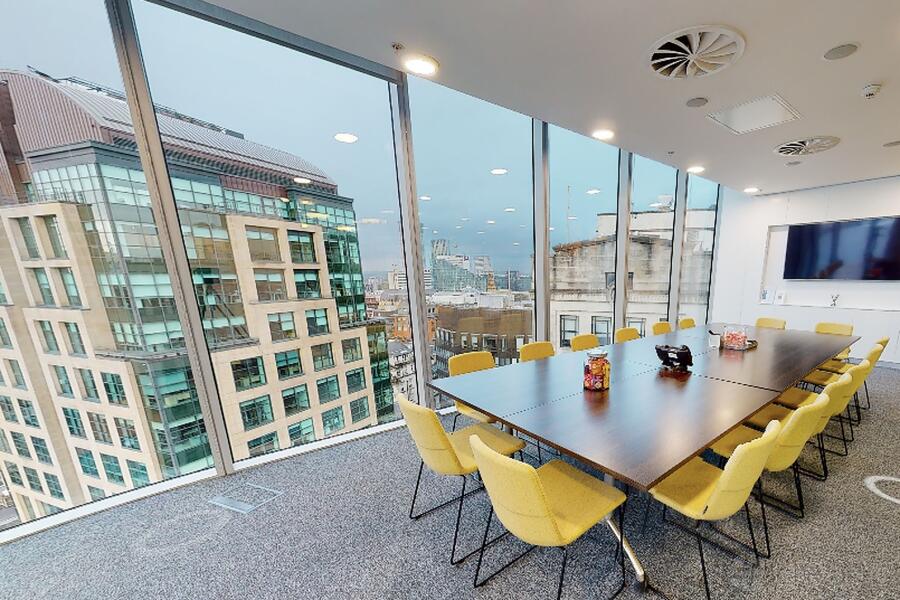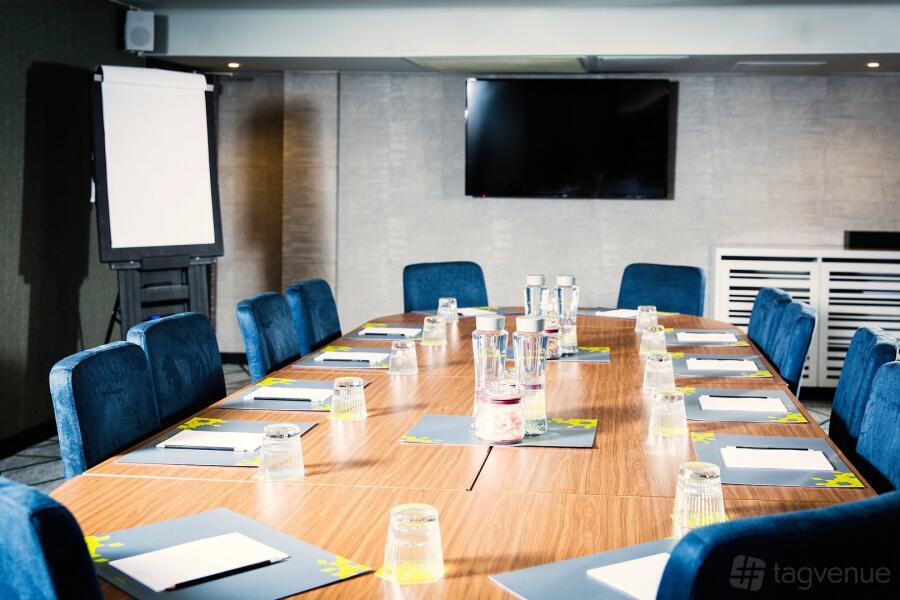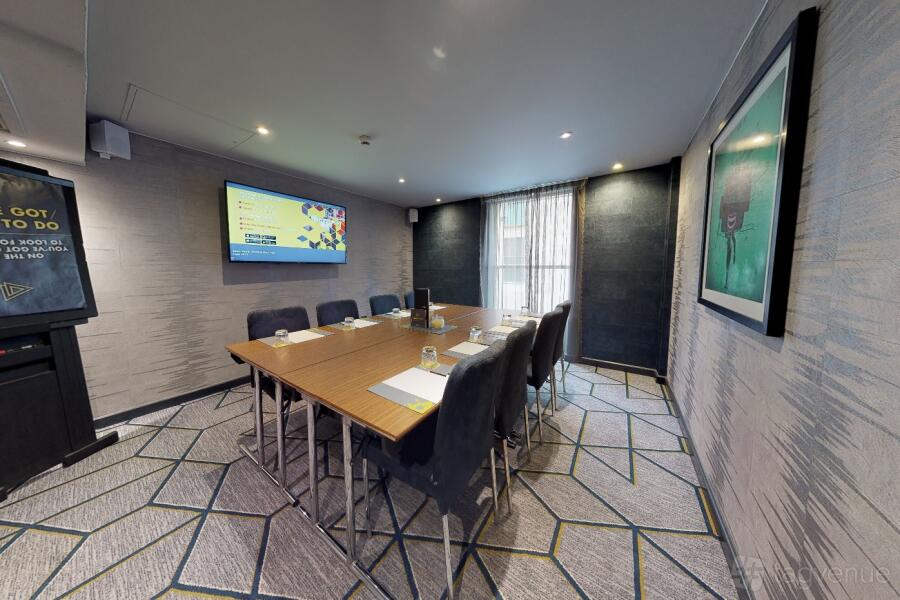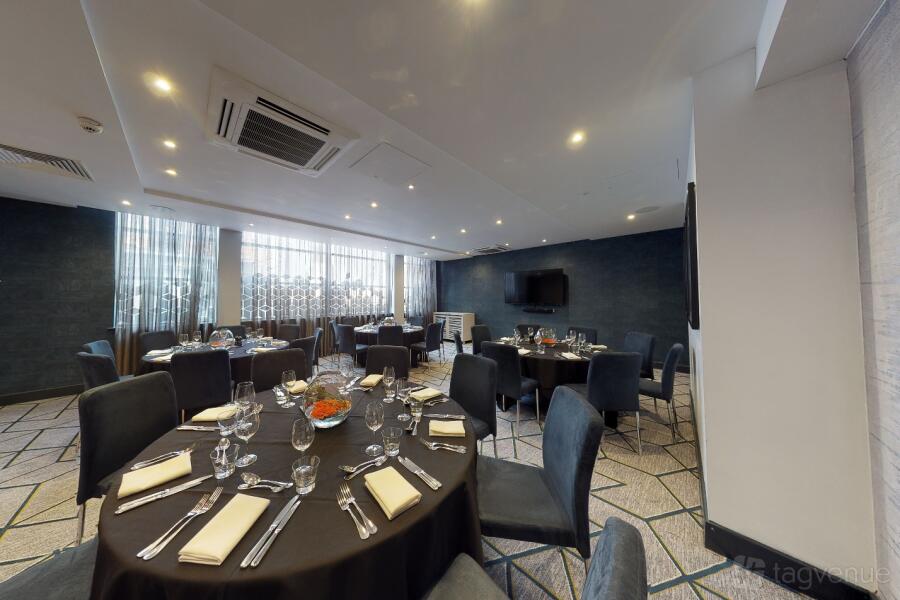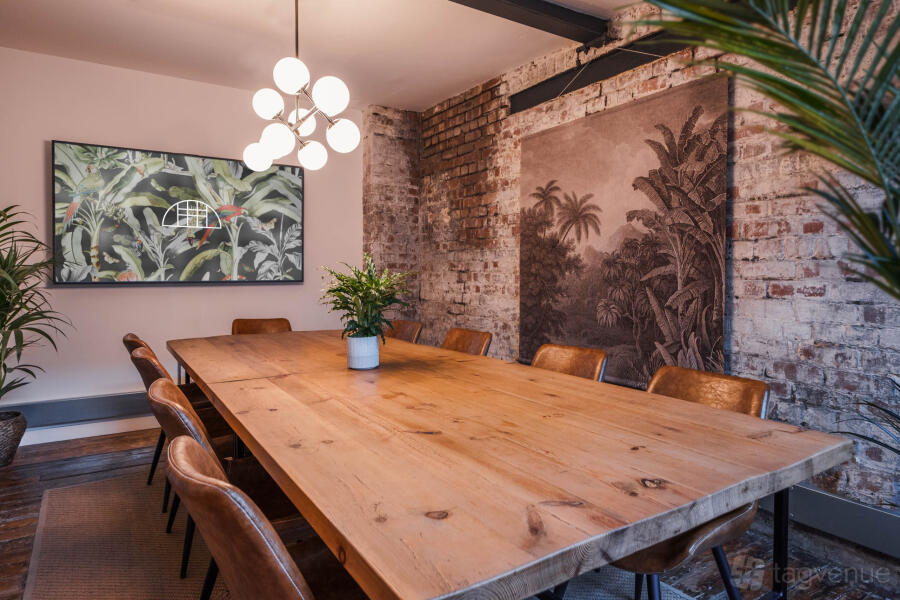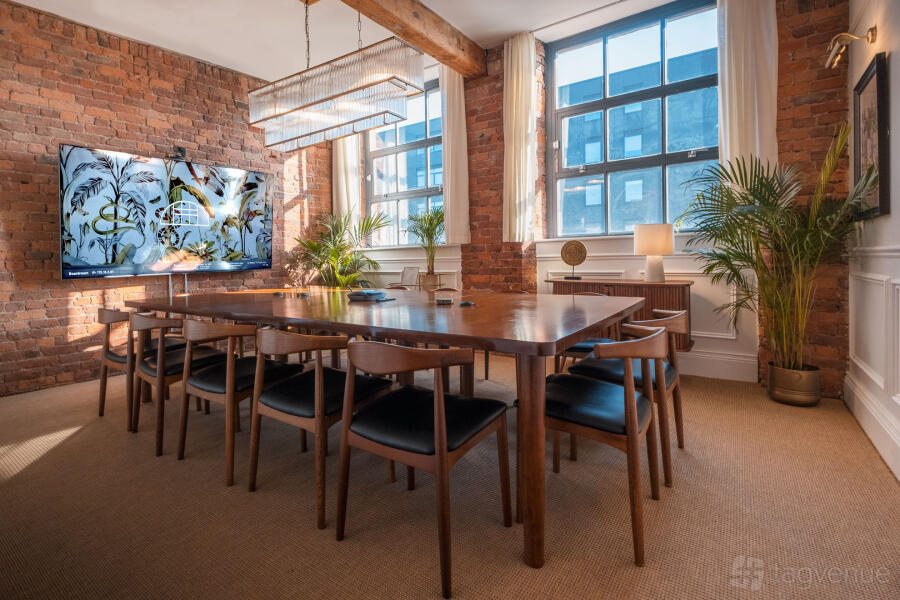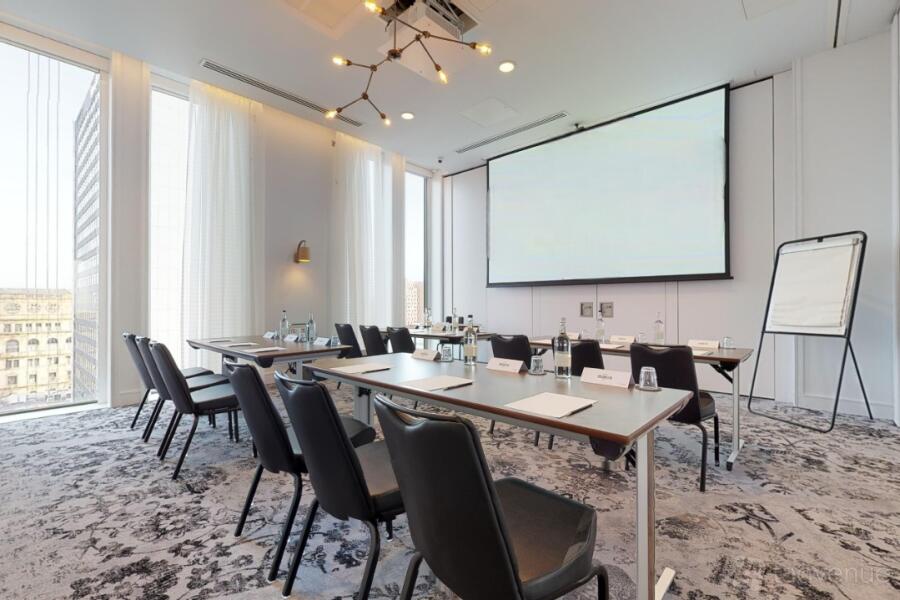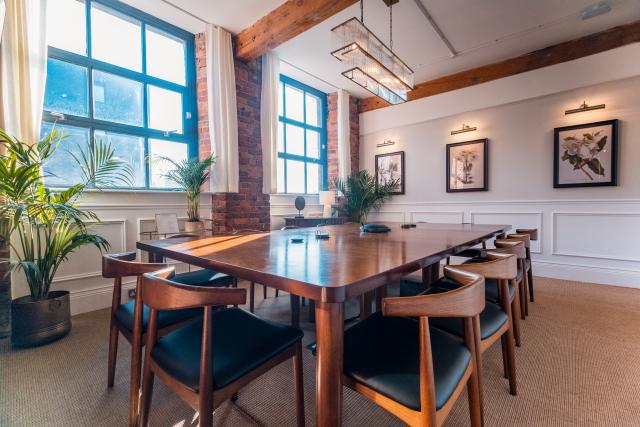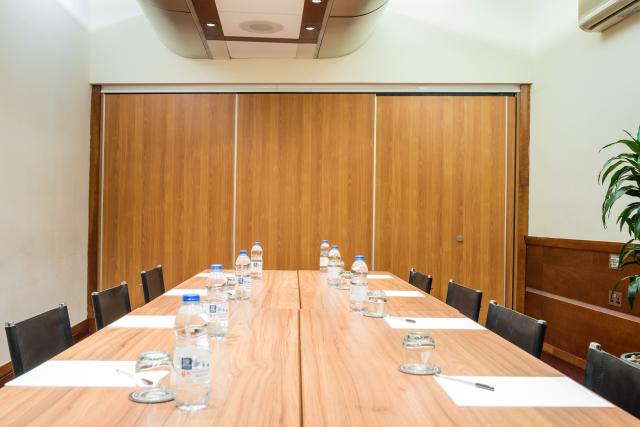Top Meeting Rooms in Manchester
In Manchester, you will find meeting rooms that answer your needs! Coworking spaces and boardrooms are waiting for your next business gathering, training session or interview. Looking for something more casual? You will find it here as well! Search through our selection of event spaces, workshop studios and hotel venues - Manchester remains a popular spot for meetings of all kinds. Hop over to our search bar, put in your requirements and let Tagvenue help you book the best meeting room for yourself!
-
from £150
hire fee / per dayBook nowThe Clements Suite
6 guestsBiz Hub 49 PiccadillyManchester City Centre#Supervenue
LLynne M.
“Easy booking of central Manchester located meeting space. Modern, clean and with good facilities.” -
from £354
hire fee / per morningBook nowMeeting
18 guestsManchester Art GalleryChinatown, ManchesterNNikola P.
“Lovely Meeting room, Excellent service received, Amazing venue to host your boardroom meetings.” -
from £45
hire fee / per hourBook nowThe Phelan Suite
10 guestsThe Meeting RoomsNorthern Quarter, Manchester#Supervenue
NNatasha P.
“They are cosy and homely - very different to the usual strip-lit corporate meeting rooms.” -
from £113
hire fee / per hourBook nowRylands
18 guestsLandmark: Chancery Place, ManchesterManchester City CentreAAlan B.
“Super venue, friendly and helpful staff, exactly as advertised, easy booking. Perfect for meetings” -
from £350
hire fee / per dayBook nowWork + Play 2
24 guestsMalmaison ManchesterManchester City Centre#Supervenue
SSteve B.
“Excellent meeting room facilities, lovely hot and cold buffet lunch, perfect venue for us.” -
from £36
hire fee / per hourBook nowThe Rylands Suite
8 guestsBiz Hub 49 PiccadillyManchester City Centre#Supervenue
JJoanne B.
“Great little meeting room and excellent service from the Biz Hub.” -
from £72
hire fee / per hourBook nowThe Taylor Suite
28 guestsThe Meeting RoomsNorthern Quarter, Manchester#Supervenue
AAine M.
“Overall, an excellent experience and a venue I would highly recommend for meetings or events.” -
from £300
hire fee / per dayBook nowWork + Play 1
15 guestsMalmaison ManchesterManchester City Centre#Supervenue
CCathryn N.
“Excellent venue for our meeting and friendly staff.” -
from £425
hire fee / per dayBook nowWork + Play 3
60 guestsMalmaison ManchesterManchester City Centre#Supervenue
SSteve P.
“Great meeting room / space handy for station” -
from £54
hire fee / per hourBook nowLower Meeting Room
12 guestsBeehive LoftsAncoats, Manchester#Supervenue
KKate M.
“We had a whole day meeting in there and everyone loved it.” -
from £66
hire fee / per hourBook nowThe Boardroom
14 guestsBeehive LoftsAncoats, Manchester#Supervenue
BBethan T.
“The meeting room itself was excellent and exactly as described and in the pictures.” -
from £500
hire fee / per sessionBook nowThe Victoria Suite
30 guestsvoco ManchesterManchester City Centre#Supervenue
SSarah L.
“This is our second time having a meeting in the Salvation Bar and I cannot fault it.”
- 1
- 2
- 3
- ...
- 20
Popular filters
Capacity
Budget
Area type
Venue type
Catering and drinks
Accessibility features

FAQs about Top Meeting Rooms in Manchester
In Manchester, prices of meeting rooms average around £60 hire fee per hour. The exact costs depend on the room size, audiovisual equipment (such as projectors or microphones), or high-speed Wi-Fi. Additional services, such as catering or on-site coordinators, may cost extra. Flexible configurations for presentations, workshops, or networking, along with amenities such as parking or dedicated breakout rooms, will also affect the price. See usual price ranges in Manchester, based on Tagvenue data, as of February 2026:
| From £44 | to £88 | hire fee per hour |
| From £250 | to £450 | hire fee per day |
| From £35 | per person |
Based on the popularity and user ratings on Tagvenue (updated February 2026), the best options include:
-
The Phelan Suite at The Meeting Rooms in Northern Quarter - rated 4.9/5
Our user said: ‘I needed a meeting space with a large TV/wifi to conduct a presentation and it was perfect.’ -
The Clements Suite at Biz Hub 49 Piccadilly in Manchester City Centre - rated 4.8/5
Our user said: ‘Easy booking of central Manchester located meeting space.’ -
Meeting at Manchester Art Gallery in Chinatown - rated 4.7/5
Our user said: ‘The room was more than sufficient for our needs and also nice and bright.’
You'll find meeting rooms in various sizes, from smaller spots to larger venues; keep in mind that the type of space and your chosen layout will affect the capacity! Below you can see the typical venue sizes in Manchester, together with the standard prices in each size range, based on Tagvenue data (February 2026):
| Small | up to 10 guests | prices average £54 hire fee per hour |
| Medium | between 15 and 30 guests | prices average £72 hire fee per hour |
| Large | over 30 guests | prices average £450 hire fee per day |
These are the venues within 0.1 mi from central Manchester, available to book on Tagvenue:
-
Standard Events Space at The University of Law - Manchester Campus
on 2 New York Street - 0.1 mi from centre.
Venue said: Located at The University of Law - Manchester Campus, this space combines practicality with a touch of elegance. The room is arrayed with sleek, modular tables and comfortable seating, facilitating collaborative sessions... -
Azzurro at Gilbanks, 11 York Street
on 11 York Street - 0.1 mi from centre.
Venue said: The room can accommodate up to 18 guests in a boardroom style. This makes the space perfect for training sessions, seminars, company presentations or any other large meeting. -
Congress at Mercure Manchester Piccadilly
on Portland Street - 0.1 mi from centre.
Our user said: ‘The location was great and the room was perfect for our needs.’
Manchester is one of the best connected cities in England. With four major railway hubs in the centre (Piccadilly, Victoria, Oxford Road and Deansgate) and the third busiest airport in the UK, the city is easily accessible. Manchester also boasts a wide selection of meeting spaces of all types, from modern rooms to spacious stadium suites, so you are sure to find just what you need for your meeting here. With a range of accommodation facilities, you will have no problem organising a series of meetings here.
Manchester’s city centre is full of areas to host any kind of a get-together. The Central Retail District makes a great location for a business meeting. The Northern Quarter is where history meets modern culture and you are sure to find a unique meeting venue here. If you want to host your meeting both close to the city centre and a transport terminal, search for meeting rooms near Manchester Piccadilly. As the biggest of the four main stations, it’s a major transportation hub easily accessible via Metrolink or the bus network. Salford Quays, possibly the hottest spot in Greater Manchester, is a hub for culture, shopping and business as well. Search around Manchester Airport if you’re hosting a meeting for delegates travelling by air or looking for great hotel meeting rooms.
Check the size of the room and how many people it can accommodate. Make sure the room has all the equipment you will need for your meeting. See if the venue provides a wireless internet connection strong enough for the number of participants you’re expecting. If you’re planning to have food or drinks during your meeting check if the venue will provide them or if you will need to take care of it yourself. Some meeting venues offer complimentary water, tea, coffee and biscuits, some work with external caterers and others allow you to provide the food and beverages yourself.
Your Guide to Hiring Meeting Rooms in Manchester
Meeting spaces are some of the most popular and versatile venues you can hire for your business. Fortunately for you, this Northern city has many options to choose from, so you will be able to find a place that will suit your needs in a flash. Meeting spaces in Manchester are tailor-made for productive gatherings, and beyond the typical business meeting, these spaces are also suitable for hosting events and gatherings of all kinds.
Events You Can Host in Manchester’s Meeting Rooms
- Training sessions and workshops thrive in spaces that feel open and engaging. These events are all about hands-on learning, interactive discussions, and team-building, so it’s important to book a venue, like The Studio Manchester in Piccadilly, that offers enough space to move, and include break out areas for smaller groups.
- Seminars, presentations, and corporate talks benefit from a more structured setup. When you're gathering professionals for expert panels, symposia, or AGMs, look for venues in Manchester City Centre, with essential tech like projectors, microphones, and flipcharts.
- Creative planning and brainstorming sessions work best in informal spaces where teams can relax and think freely. Smaller meeting rooms with flexible furniture layouts, natural light, and a more casual atmosphere are great venue options.
Things to Consider When Booking a Meeting Room in Manchester
Start your search by deciding where your meeting should take place. Training rooms in the City centre are great if your guests are arriving by train, but they usually come at a higher price. If you don’t need a central spot, venues on the outskirts often offer good value too, especially if people are driving.
Consider the kind of space your event needs. A formal board meeting will feel more polished in a boardroom with a professional setup, while a smaller meeting space might work better for team catch-ups or creative sessions.
Facilities also make a difference. Good Wi-Fi, AV gear, and a whiteboard could be non-negotiables depending on what you’re planning. And if it’s an all-day session, it helps to be somewhere that either offers catering or is close to decent food spots.
If attendees are coming from out of town, choosing a meeting venue near hotels or major stations like Piccadilly or Victoria will save everyone time—and hassle.
How to Plan a Successful Meeting in Manchester
Running a productive meeting starts well before anyone steps into the room. The most important thing is having a clear purpose. Know exactly why you’re gathering and what outcome you’re aiming for. It helps you keep things on track and helps everyone stay focused.
Once you’ve nailed down the goal, the next step is choosing the right venue. Manchester has many meeting rooms for hire. There are plenty of large hotel meeting rooms with AV equipment and good acoustics for seminars or conferences. For smaller teams or creative discussions, book a space in a quieter location.
- Comfort matters more than people expect. Everyone should have enough room to sit and move comfortably. No one does their best thinking when they’re crammed into a corner. It’s also a good idea to sort out refreshments before things kick off. Coffee, tea, and a few light snacks go a long way toward keeping energy levels up, especially during longer sessions.
- Avoid scheduling right after lunch or just before a long weekend. People are less focused then. Mornings or early afternoons tend to be better for getting things done. Whatever time you choose, make sure everyone knows how long the session will last and when they can expect breaks. It’s a small detail, but it shows you respect their time.
- Finally, show up prepared. Test your tech before the meeting starts and make sure you’ve got everything from pens to power cables ready to go.
How to Plan a Budget-Friendly Meeting in Manchester
Need to host a meeting in Manchester without overspending? Here’s how to cut costs without cutting corners.
-
Book affordable meeting rooms in the right location: Private meeting rooms in central Manchester can get pricey fast. Look out for cheap options in up-and-coming areas like Ancoats or on the outskirts, especially near tram or train stops. Pubs and restaurants often rent out private meeting rooms for business use, like for working lunches.
-
Be smart about food: Skip fixed catering packages when you can. Many meeting rooms near you let you bring in food or get deliveries from nearby cafes. That flexibility can save you a lot and people tend to like local food anyway.
-
Avoid peak times: Venue prices spike during holidays and weekends. If you’re flexible, opt for midweek slots or book in advance to grab meeting spaces with flexible booking options and early-bird discounts.
-
Know your numbers: Finalise your guest list early. That way, you won’t overbook space or over-order catering. Send out invites with clear RSVP deadlines.
-
Use what's already included: Many top venues for meetings in Manchester include AV, whiteboards, or even hybrid tech in the rental fee. Look for places that list what's included so you don’t have to rent extra gear. If you do need extras, ask about renting vs. buying.
People also search for
Meeting Rooms in nearby suburbs
Meeting Rooms in North West England
Meeting Rooms in other cities
Verified Reviews of Meeting Rooms in Manchester
Page last updated in February 2026
To provide you with relevant information, our pages are refreshed using an algorithm that aggregates real-time data, including bookings, reviews, and venue updates.
